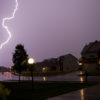If you have a swimming pool, one thing you are always on the watch for is a pool leak. If left untended, a small leak can cause big problems over time. The most pragmatic advice if you suspect your pool has a leak is to reach out to pool service professionals to fix the leak. Also, with regular service and pool maintenance, you may be able to identify potential leaks or other problems long before they cause damage. So, what can be done if your pool leaks?
Some things that pool owners should know include the following:
Identify the Real Issue
So, is it a leak or could it be something else? If the only evidence that you have of a potential leak is a lower water level, it might simply be evaporation. It is estimated that a typical pool can lose nearly two inches of water per week, depending on the weather conditions. Some other things that can cause your pool to evaporate faster and lose water include:
- High sun exposure
- Extreme temperatures
- Low levels of humidity
Before you assume that you are losing water due to a leak, consider the issue of evaporation if your region is experiencing extreme weather, higher-than-normal temperatures, or other climatic conditions.
Take a Bucket Test
Know that even the smallest leak can have big consequences. First, it wastes water, energy, and pool chemicals, but it also may cause costly water damage to your home and property. If your pool is leaking, you need to know. Conduct your own test- like the Bucket Test- to get to the bottom of evaporation and determine if your pool is leaking.
Follow the following steps to conduct your own Bucket Test, and to find out if you have a leak:
- First, fill a regular household bucket with swimming pool water from your pool.
- Place the bucket on one of the pool steps and adjust the water level inside the bucket until it is even with the water level on the outside of the bucket.
- Make a mark or indication of the water level with a marker or some colored tape. Mark the level both inside and on the outside of your water bucket. This will allow you to see the level of the water in the pool, as well as the level of the water inside your bucket.
Compare the markings on the inside and outside of the bucket to determine if evaporation is happening at the same rate or if your pool is losing water faster due to a leak. While this is not definitely telling you why the pool is leaking, it is likely to demonstrate the cause of water being lost from the pool. If you notice a difference in the two water levels, there could be a leak.
Find the Underlying Cause
Once you have ruled out evaporation, try to find out why and where the pool is leaking. Is the swimming pool older? Was it installed properly by a professional? Could there be an issue with deteriorating seals or leaks in the PVC piping around the equipment? If your pool was plumbed in professionally, you can contact the plumber to ask them to inspect the lines and system for your pool. It could be that a loose-fitting or human error is the cause of the leak. These are all pertinent questions that the homeowner should ask when trying to pinpoint and find the underlying cause of the pool leak.
Take Precautions
Pool leaks can often be prevented when homeowners use precautions and have yearly inspections of their pool and related plumbing. While it makes the most sense to consult with a pro, you can troubleshoot a few common areas around your pool that are prone to leaks first. Typically, there are a few locations where leaks are likely to happen. While there may be numerous variables contributing to your pool’s leak, the skimmer, pool light, and return interfaces are common areas.
Rule Out Plumbing Problems
It is not uncommon to encounter issues related to the plumbing of the pool. It makes sense to incorporate annual plumbing inspections into your home maintenance regimen. These types of problems are perhaps more common in areas with extreme weather.
Watch for Signs of Leaks
Do you know the signs to watch for in terms of a pool leak? Be wary of the following, and talk to your pool service professional to learn more:
- If you notice loss of water that does not match up to the climate conditions and normal evaporation, you should consider a leak.
- Shifting of the pool tiles could also be a sign of a leak and subsequent water damage.
- Get suspicious if you notice an increase in your water or utility costs.
- Another sign of a leak is an increase in the algae growing in and around the pool.
- If you notice puddles of water in your yard or on the property, you could have a swimming pool leak. Call your pool repair professional right away.
Call a Pool Pro
Yes, it makes the most sense to call on a pro for repair options; plus, they can clean or treat your water to get your pool ready for a swim. You can address cracks with some putty or caulk to prevent further damage until the pros can come and address your pool leak in a more permanent manner. If you have home or property insurance, there may be some coverage or compensation available for your leak.
Think your pool has a leak? Talk to the team at Pool Troopers to be sure! Pool Troopers is a full-service swimming pool service company that provides chemical service and pool cleaning to pool owners in Florida, Texas, and Arizona. Since 1952, they have been serving their clients and helping maintain their swimming pools. Call or schedule online today!



